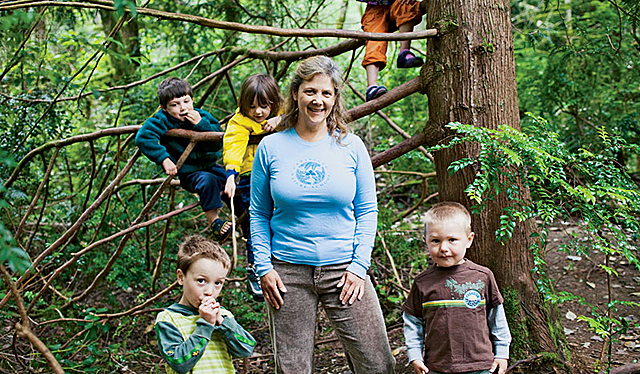sierraclub.org - sierra magazine - november/december 2010 - act
Immersion Program

Erin Kenny, director of Cedarsong Nature School, Vashon Island, Washington | Photo by Michael Hanson
"When the kids show up in the morning for forest kindergarten, we meet them at the entryway and all walk into the woods together. Then we wait to see where the kids gravitate. There's a beautiful mud puddle, and sometimes they just want to muck around. Or maybe they want to head over to the music blanket, and we'll do a little musical jam; we write our own songs here. Sometimes students want to split up, which is why we're committed to a small teacher-to-student ratio. We do a lot of imaginative play out here, and the kids love storytelling, splashing in puddles, digging in the sandpile, and ripping bark off fallen trunks.
"Before long, some science lesson presents itself. A child notices something or asks a question, and we swoop in with a little lesson, even if it's only 30 seconds long. They do have a short attention span, but when they're interested, they can really focus. If they have direct experience with their hands, the lesson becomes that much more ingrained.
"Three years ago we began Cedarsong Nature School on the theory that American children are suffering because they don't get enough unstructured time outdoors. There weren't really any nature-based preschools in the U.S.—most of them are in Germany. I didn't know how Americans would receive it. Who'd be willing to send their kids out to play for three solid hours in the pouring rain? But it turns out that a lot of parents are looking for that type of experience for their three- to five-year-old children.
"We don't have a set curriculum, but there are seasonal themes. In the fall we learn about decomposition and how soil is formed; in the spring we identify birds and talk about the four stages of insect growth. The kids are much more interested if they lead the way. Their grasp of environmental principles is astounding." —interview by Kristin Baldwin
TATER TOTS American children between the ages of three and five spend an average of 32 hours a week in front of a TV screen, according to a University of Michigan study.
ON THE WEB Web Watch a video about Cedarsong Nature School's forest kindergarten at http://bit.ly/cedarsong.